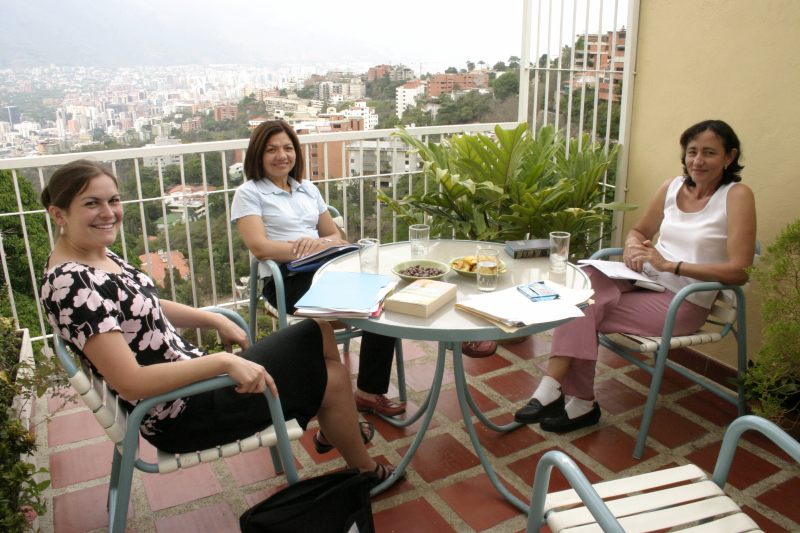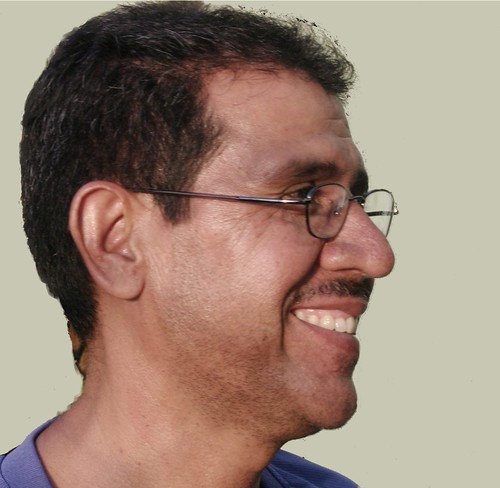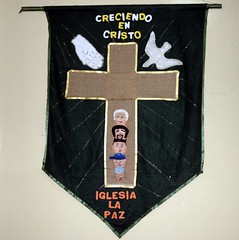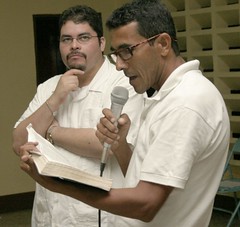
Luz Maria and I traveled north to Barquisimeto for a pastor’s conference at Cristo es Amor (Christ is Love) Lutheran Church from June 25 to 26. It was privilege to celebrate the 495th anniversary of the Presentation of the Augsburg Confession with other pastors of our national church, the Lutheran Church of Venezuela.
Argénis Hernández, pastor of Ascension Lutheran Church in San Félix de Guayana, offered a meditation on Matthew 10:26-33 at the opening Matins service on June 25. I did the same for the appointed epistle, 1 Timothy 6:11-16, at Vespers.
The word “confession” is used in different ways. Perhaps most widely understood is the confession of sins. “If we confess our sins, He is faithful and just to forgive our sins and to cleanse us from all unrighteousness”, 1 John 1:9. In the Lutheran church, confession of sin may be public or private. The dialogue of communal confession of sin by the congregation and absolution by the pastor as part of the Divine Service is of ancient origin. But Lutherans also retain the practice of private confession, either specific sins to a neighbor one has wronged, or sins that weigh particularly heavy on the heart to the pastor. Private confession is not a requirement, but a gift.
“Confession” as declaration of faith, or creed, is always understood as a public, not a private matter. (The word “creed” is derived from the Latin “credo” or “I believe”.) This is the essence of public worship, as shown in Nehemiah 8:1-12, the Old Testament lesson which was not read. Ezrah the priest publicly read from the books of Moses and all the people answered “Amen, Amen!”, while lifting up their hands. “And they bowed their heads and worshiped the LORD with their faces to the ground.” God speaks to us in his infallible Scriptures, and we respond.Whether one says “I believe” or “we believe” does not matter, for what follows is not personal opinion, but an authoritative articulation of what the Scriptures say. An open proclamation of the truth and a steadfast defense of the truth, is demanded for every follower of Christ.
“Therefore whoever confesses me before men, him will I confess also before my Father who is in heaven. But whoever denies me before men, him will I also deny before my Father who is in heaven”, Matthew 10:33.“Do the work of an evangelist”
St. Paul also tells his disciple in 2 Timothy 4, “But you be watchful in all things, endure afflictions, do the work of an evangelist, fulfill your ministry.” This served as the basis for another highlight of the pastor’s conference was a presentation by Carlos Ventura on “The Pastor as Evangelist”.The word εὐαγγελιστής (euaggelistés) is used in only two passages of the New Testament. Ephesians 4:11 sets evangelists among Christ’s gifts to His church: “And it was He who gave some to be apostles, some to be prophets, some to be evangelists, and some to be pastors and teachers”.Apostles and prophets are those who received direct revelation from God. Because the canonical books of the Old and New Testaments contain all we need to know for salvation, there is no need for new revelation, therefore apostles and prophets do not exist in the contemporary church.
 “Pastors and teachers” describes the regular ministry of publicly preaching the Word and administering the sacrament, which in all periods of the church has been and remained the same. The expression “teachers” probably refers chiefly to the public activity, while the other, “pastors,” to the application of the pastoral office to the individual members of the congregation. “Evangelists” is placed on the list in between apostles and prophets, and pastors and teachers.
“Pastors and teachers” describes the regular ministry of publicly preaching the Word and administering the sacrament, which in all periods of the church has been and remained the same. The expression “teachers” probably refers chiefly to the public activity, while the other, “pastors,” to the application of the pastoral office to the individual members of the congregation. “Evangelists” is placed on the list in between apostles and prophets, and pastors and teachers.
In Acts 21:8, the title of evangelist is given to Philip, one of the original deacons of the church selected by the congregation at Jerusalem in Acts 6, but driven from the city by later persecution. Philip’s activities in Acts 8 are the only description given of “the work of an evangelist”.
He travels as an itinerant missionary, preaching and baptizing, performing miracles in Christ’s name, but under the authority of the apostles. Peter and John had to travel to Samaria to confirm the validity of Philip’s baptisms (Acts 8:14-17).
So what of Paul’s admonition to Timothy, a pastor and bishop, to do the work of an evangelist? We may conclude that even as the apostolic mission of the church continues without the apostles (Matthew 28:16-20; Mark 16:15-16; Lucas 24:47-48; Acts 1:8), the work of an evangelist is not limited to the pastoral office. For Acts 8:4 says all who fled Jerusalem “went everywhere announcing the good news” (literally, εὐαγγελιζόμενοι, euangelizomenoi, evangelizing). It is highly desirable for all members of a local congregation to share the Gospel with family, friends and co-workers, pray for them and invite them to church. But the pastor also has an important rose to play in evangelism, as a teacher, guide and planner of intentional strategies.
 |
| Pastor Carlos Ventura and his wife, Berkis, with Meduardo Aparismo, the youngest of the five children of Rafael and Sabrina Aparismo, one of the founding families of El Redentor Lutheran Church. |
A pioneer pastor
This month El Redentor (Redeemer) Lutheran Church of San Antonio de Capayacuar, Monagas state, will celebrate its 70th anniversary. During our spare moments in Barquisimeto, its current pastor, Carlos Ventura, talked with me about Heinrich Zeuch, its first pastor, installed in 1955. Zeuch was ordained as a deacon in Germany. During World War II, his home in Berlin was destroyed by Allied bombing, leaving his family without a place to live. After the war, the Zeuchs arrived in Venezuela in refugees on an Italian ship, thanks to Gerhard Zeuch, Heinrich's son, who already had a job as an agronomist on a tobacco plantation. After many struggles and difficulties, they settled in San Antonio. At that time, San Antonio did not have electricity, a hospital or paved roads. Heinrich taught adult Bible classes and vacation Bible schools in the area, and was colloquized as Lutheran Church - Missouri Synod missionary before being called to serve El Redentor. San Antonio de Maturín became for many years in the center of a growing Lutheran presence in the state of Monagas and the southern zone of Sucre state. We returned from Barquisimeto on Friday. Day after day of heavy rains and strong winds in northwestern Venezuela made the rivers overflow, the dams explode, landslides and closed roads. The government quickly declared an emergency state in the mountain states of Trujillo, Tachira and Mérida, and eight of the 12 municipalities in the state of Barinas. In the afternoon Wednesday, June 25, 2025, the intense rainfall affected the state of Portuguesa, leaving the overflow of several rivers and the flooding of communities near the road that leads to the city of Guanare. Flooding of the Ospino River and overflow of a dam caused the collapse of the La Trinidad bridge on the José Antonio Páez highway, between Barquisimeto and Barinas. A detour around the collapsed bridge took us on a wild ride on a old, two-lane road as heavy traffic continued to flow as if on four lanes and roadside crews removed debris. We are now high and dry on our hilltop, but we ask you to please pray for those left homeless and otherwise affected by the inclement weather (200,000 families in Barinas state alone).
We returned from Barquisimeto on Friday. Day after day of heavy rains and strong winds in northwestern Venezuela made the rivers overflow, the dams explode, landslides and closed roads. The government quickly declared an emergency state in the mountain states of Trujillo, Tachira and Mérida, and eight of the 12 municipalities in the state of Barinas. In the afternoon Wednesday, June 25, 2025, the intense rainfall affected the state of Portuguesa, leaving the overflow of several rivers and the flooding of communities near the road that leads to the city of Guanare. Flooding of the Ospino River and overflow of a dam caused the collapse of the La Trinidad bridge on the José Antonio Páez highway, between Barquisimeto and Barinas. A detour around the collapsed bridge took us on a wild ride on a old, two-lane road as heavy traffic continued to flow as if on four lanes and roadside crews removed debris. We are now high and dry on our hilltop, but we ask you to please pray for those left homeless and otherwise affected by the inclement weather (200,000 families in Barinas state alone).











![Reblog this post [with Zemanta]](http://img.zemanta.com/reblog_e.png?x-id=88e81458-a090-8639-96df-5844298902d4)









 He continued studying theology through the Juan de Frias Institute and eventually served as pastor of Principe de Paz (Prince of Peace) Lutheran Church in the small village of Sierra Caroni.
He continued studying theology through the Juan de Frias Institute and eventually served as pastor of Principe de Paz (Prince of Peace) Lutheran Church in the small village of Sierra Caroni.

















